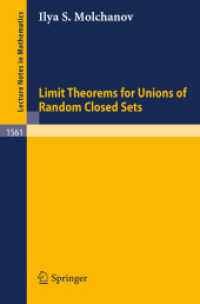- ホーム
- > 洋書
- > 英文書
- > Philosophy
Full Description
Argues for the importance of the neglected theme of slavery in Antigone.
In this groundbreaking book, Tina Chanter challenges the philosophical and psychoanalytic reception of Sophocles' Antigone, which has largely ignored the issue of slavery. Drawing on textual and contextual evidence, including historical sources, she argues that slavery is a structuring theme of the Oedipal cycle, but one that has been written out of the record.
Chanter focuses in particular on two appropriations of Antigone: The Island, set in apartheid South Africa, and Tègònni, set in nineteenth-century Nigeria. Both plays are inspired by the figure of Antigone, and yet they rework her significance in important ways that require us to return to Sophocles' "original" play and attend to some of the motifs that have been marginalized. Chanter explores the complex set of relations that define citizens as opposed to noncitizens, free men versus slaves, men versus women, and Greeks versus barbarians. Whose Antigone? moves beyond the narrow confines critics have inherited from German idealism to reinvigorate debates over the meaning and significance of Antigone, situating it within a wider argument that establishes the salience of slavery as a structuring theme.
Contents
Preface
Acknowledgments
List of Abbreviated Titles
1. Introduction: The Shadowy Others of Antigone's Legacy
2. Antigone's Liminality: Hegel's Racial Purification of Tragedy and the Naturalization of Slavery
Hegel's Prohibition of Slavery as a Tragic Topic
Sculpting Antigone's Ethics from the Gods of "Nature"
The Simplicity, Solidity, and Plasticity of Tragic Heroes in a Pre-Legal Era
Art Must Be Purer than Life
3. The Performative Politics and Rebirth of Antigone in Ancient Greece and Modern South Africa: The Island
The Incessant Renaissance of Antigone
Performative and Political Reflections on Greek Tragedy
Intervening in Fetishistic Readings of Antigone
Antigone's "False Titties": The Island
Concluding Remarks
4. Exempting Antigone from Ancient Greece: Multiplying and Racializing Genealogies in Tègònni: An African Antigone
Butler and Mader: Making Polynices Only a Brother
Citizens, Substitutes, and Slaves
A Story to Pass On? Antigone's Mythological African Sister, Tègònni
5. Agamben, Antigone, Irigaray: The Fetishistic Ruses of Sovereignty in Contemporary Politics
6. Concluding Reflections: What If Oedipus or Polynices Had Been Slaves?
Synopses of The Island and Tègònni
Notes
Bibliography
Index






